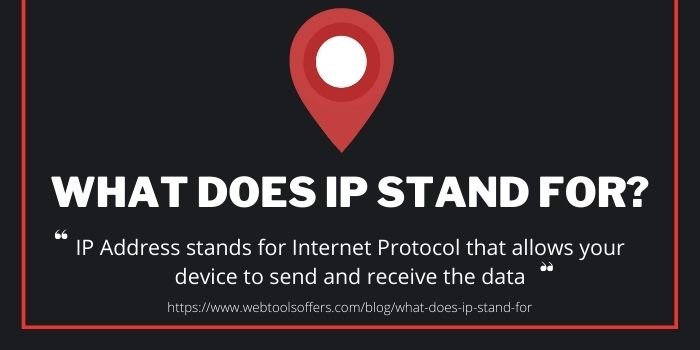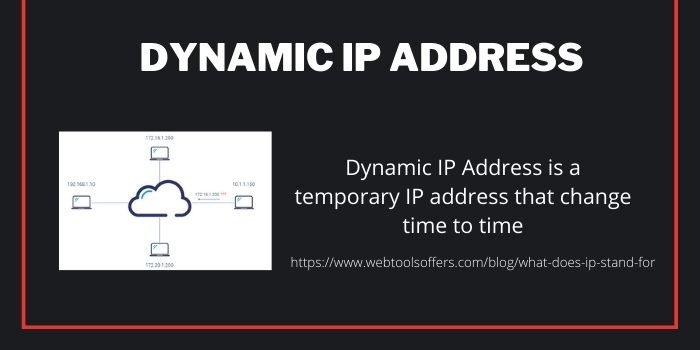What Does IP Stand For?

IP Address is a unique address that is used for identifying the address of your device. The term “IP” basically stands for Internet Protocol. Whenever you will connect to the Internet the IP Address allows your device to send and receive the data. It allows the device to communicate with each other by connecting with the Internet. An IP Address is identified in numbers. For example- 1234.543.908.
In this digital world, several devices are connected to the network that means there are billions of IP Addresses. There are two different versions of IP Addresses – IPv4 and IPv6. The IPv4 is the older version of IP Address that offers 4 billion IP Addresses but the IPv6 which is the new version of IP Address offers a trillion IP Addresses. As the world is evolving and the use of the Internet is increasing, so IPv6 can only fulfill the requirements of Internet users around the world. There are basically two types of IP Addresses- Static IP Addresses & Dynamic IP Addresses.
What is IP Address & How do IP Address work?

If you are online and going to use the Internet connection then your IP address is used to establish a connection. Whenever you will go online and get to search anything over the Internet by connecting with an Internet connection you need an IP Address to establish a connection between your Internet and server. IP Address plays a very important role in connecting via an Internet connection.
What Are The Types Of IP Addresses?
IP Address is the unique address of your device which is basically used for the identification or it also helps you to connect with other devices. There are two types of IP Addresses. Let’s discuss all of them in detail-
- Static IP Address
- Dynamic IP Address
Static IP Address

Static as the name suggest that it won’t be changed. A Static IP Address is the type of IP Address that doesn’t change. Status IP Address is the IP Address assigned to your device it can not be changed until your device’s architecture changed it.
Static IP Addresses are basically used by the devices and equipment. Whenever you will purchase any device it has its unique IP address which can’t be changed. It only can change by the administration wh has discovered that device. It is basically known as the fixed IP address. An address that is permanent and does not change while connecting to Internet connections.
Advantages of Static IP Address
There are several advantages of Static IP Address. Below are some of them-
- It is very easy to set up Static IP Address & manage DNS servers
- If you are hosting a server with a static IP address then it will be easy for your clients to find your websites and servers.
- With Static IP Address, it will become very easy and convenient to remote access
- It is very easy to teleconferencing and communicating via Voice over Internet protocol (VoIP)
- You can easily match an IP address with its physical location by Static IP Address.
Disadvantages of Static IP Address
With some advantages, there are also some disadvantages of Static IP Address. So let’s take a look at the disadvantages of Static IP Address-
- With Static IP Address, trackers can easily track your server present on the Internet.
- ISPs generally charge a high cost for static IP address
- Anyone can easily locate you and your device
Dynamic IP Address

Dynamic IP Address s an IP address that changes time to tie. It is not a permanent IP Address, unlike a static IP address. Dynamic IP Address is assigned by Internet Service Provider. A Dynamic IP address allows a single IP address that shuffled between the number of nodes. Your Internet connection of home or office has a dynamic IP address that changed while changing your Internet connections. It is very easy to manage and the most affordable type of IP address.
Advantages of Dynamic IP Address
There are lots of advantages of Dynamic IP Address as it is very easy to manage. Below are some of the advantages of dynamic IP address-
- It is the most affordable IP Address as you will save your maximum bucks with the dynamic IP address
- With the dynamic IP address, you will get unlimited IUP Addresses as you can re-use the IP addresses. There is a very famous example of a dynamic address that in case you will bring a new computer so you do not need to remove or edit our old computer’s IP address
- With a dynamic address, it is very hard for hackers and trackers to attack or track your device and equipment as it changes from time to time.
- It is very hard for the snoopers to find out the location of your device.
Disadvantages of Dynamic IP Address
With lots of advantages, there are some disadvantages of Dynamic IP Address. Some of them are given below-
- A Dynamic IP Address can fail to define your real geo-location as the dynamic IP address changes very fastly.
- Sometimes a dynamic IP address can interrupt the internet connection of the IP Address. Sometimes it shows downtime to your website
- If you have a dynamic IP address then you will trouble while connecting to your program
- If you are going to plan to host our website. DNS doesn’t work with dynamic IP Addresses.


















